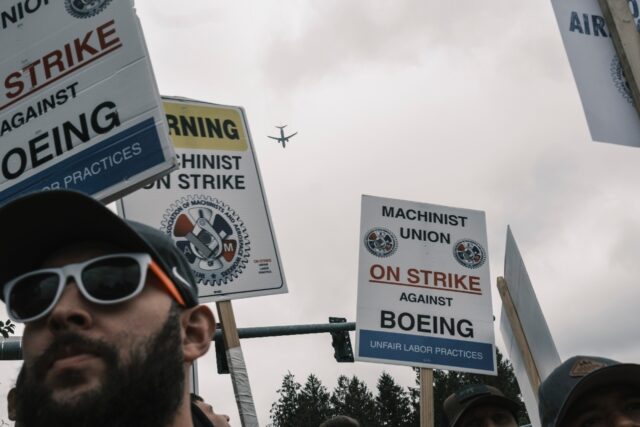Ending a strike involving more than 30,000 of Boeing’s Seattle-area workers is “a top priority” for the aviation giant, chief executive Kelly Ortberg said in a message to staff Friday.
His note comes as the strike — which has shuttered assembly plants for the 737 MAX and 777 — enters its second week.
“Ending the strike is a top priority,” said Ortberg.
“During mediation with the union this week, we continued our good faith efforts to engage the union’s bargaining committee in meaningful negotiations,” he added.
“We remain very committed to reaching an agreement as soon as possible that recognizes the hard work of our employees and ends the work stoppage in the Pacific Northwest,” Ortberg said.
But he noted the company was “disappointed the discussions didn’t lead to more progress.”
Members of the International Association of Machinists and Aerospace Workers (IAM) District 751 had overwhelmingly voted on September 12 to reject a new contract, walking out hours later.
Their key demands include a wage hike of 40 percent.
This is significantly higher than the 25 percent increase touted by Boeing, but workers see the figure as misleading because the deal would also eliminate an annual bonus.
Union members complain of near-stagnant pay for more than a decade, a problem worsened by consumer inflation in recent years and by higher costs of living in the Seattle area, which is a growing tech hub.
On Wednesday, Boeing said it would start furloughs of professional and white-collar staff as it seeks to conserve cash amid the labor strike.
While both sides resumed talks on Tuesday with the help of mediators, the IAM said late Wednesday that discussions ended without result.
Leadership departure
In a separate message to employees, Ortberg announced the departure of the head of Boeing’s defense, space and security subdivision, Ted Colbert. It’s the first major change of top personnel since Ortberg’s arrival.
“At this critical juncture, our priority is to restore the trust of our customers and meet the high standards they expect of us to enable their critical missions around the world,” Ortberg said.
“Working together we can and will improve our performance and ensure we deliver on our commitments.”
Boeing’s commercial aviation business has been under renewed scrutiny since a January incident in which a fuselage panel blew out of an Alaska Airlines Boeing 737 MAX plane mid-flight, necessitating an emergency landing.
But its defense, space and security unit posted heavy losses in the most recent quarter, and is losing money on its contract with NASA over continued problems with its beleaguered spacecraft Starliner.

COMMENTS
Please let us know if you're having issues with commenting.